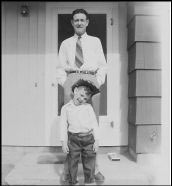If I followed up on every unsolicited pitch about an unknown musician that I receive, this column would be very dull indeed. But while recommendations from professional music-industry flacks are fairly easy to shrug off, things get trickier when the artist’s champion is my friend or family member—or, worse yet, the family member of a friend.
So imagine my trepidation a couple weeks ago, when I got an e-mail responding to a recent column on country music from the father of a close pal and read the following: “On October 6, songwriting god Bob Dylan plays Key Arena. The same night, appearing at EMP’s JBL Theater is James Talley,” who—the note went on to explain—garnered glowing comparisons to not only Dylan, but Bruce Springsteen, Merle Haggard, and Woody Guthrie in his brief mid-’70s heyday.
Would I please, my correspondent implored, spill some ink on this forgotten master?
Discovering no mention of James Talley in either the 2nd edition of the All Music Guide or the 1992 Rolling Stone Album Guide, I decided to treat this e-mail with the same courtesy I would show any professional peer: I ignored it. But after a couple days, I began to dread the inevitable follow-up call from my friend on behalf of his dad, and responded, asking him to send any music that he could, since he’d said Talley’s vintage catalog remains out of print.
Not long after, I received a copy of Talley’s 1999 CD Woody Guthrie and Songs of My Oklahoma Home (on his own Cimarron imprint), accompanied by a homemade anthology of tracks from his four albums for Capitol Records: Got No Break, No Milk, No Money, but We Sure Got a Lot of Love (1975); Tryin’ Like the Devil (1976); Blackjack Choir (1977); and Ain’t It Somethin’ (1977). Steeling my ears for a couple hours wasted listening to some whining old folkie, undoubtedly cast aside by pop historians with good reason, I popped in the compilation CD.
Almost instantly, my clenched jaw relaxed, and my gritted teeth gave way to a smile as I savored some of the liveliest country music I’ve heard in eons. What struck me first was Talley’s voice, a tangy timbre reminiscent of Willie Nelson, and the lively arrangements shot through with mandolin and fiddle. And the songs! Talley’s lyrics are full of vivid depictions of genuine working-class Americans (of all colors) and their emotions, not the blue-collar cartoons Nashville pimps nowadays.
Talley grew up in Commerce, Okla.; Richland, Wash. (about 200 miles southeast of Seattle); and Albuquerque, N. M. Early in his musical career, he was fortunate to cross paths with Pete Seeger, who listened to Talley’s first batch of tunes and told him to ignore the influence of the bustling New York City-folk scene and concentrate on capturing the voices he’d heard in his own life. That advice served Talley well. “I don’t write the songs, people write the songs,” he observes in an autobiographical excerpt at www.jamestalley.com. “I just listen to what people say and write it down.”
Take the title tune from his sophomore album, Tryin’ Like the Devil, inspired by his stints doing carpentry on construction sites in New Mexico and Nashville. “I’ve worked with old crusty carpenters in baggy overalls, tough as strap leather, with fingers missing, who chewed tobacco and spit, spraying everything in the mist, who couldn’t win a hand of five card-stud poker at the lunch break to save their lives, and who said, ‘Sonny, ain’t nothin’ a 40-hour workin’ man can hope for in this old world, except to pay his rent, the payment on his truck, and put a few beans on his table . . . and we’re all just tryin’ like the devil, ain’t we?’ Well, that sounded like a song to me, an American song, so I wrote it down.”
Alas, in 1977, the same year he performed at the inauguration at the request of President Carter, Talley split from Capitol in pursuit of a better deal that never materialized. He eventually left showbiz and turned to real estate (“Probably more people in Nashville know me in the real-estate business than the music business,” he told writer Bill Friskics- Warren in 1995), and although in recent years he has resumed recording (he didn’t release an album domestically for over 20 years) and performing with greater frequency, Talley still can’t afford to devote himself to music 24-7 and care for his family.
Which means that Talley’s rare appearance Saturday for “an evening of conversation and song” at EMP deserves your attention. Yeah, Bob Dylan is a god, and his new Love and Theft is his finest work in years. But Dylan doesn’t vanish for decades at a time; Talley already did once. Let’s try to make sure it doesn’t happen again.






